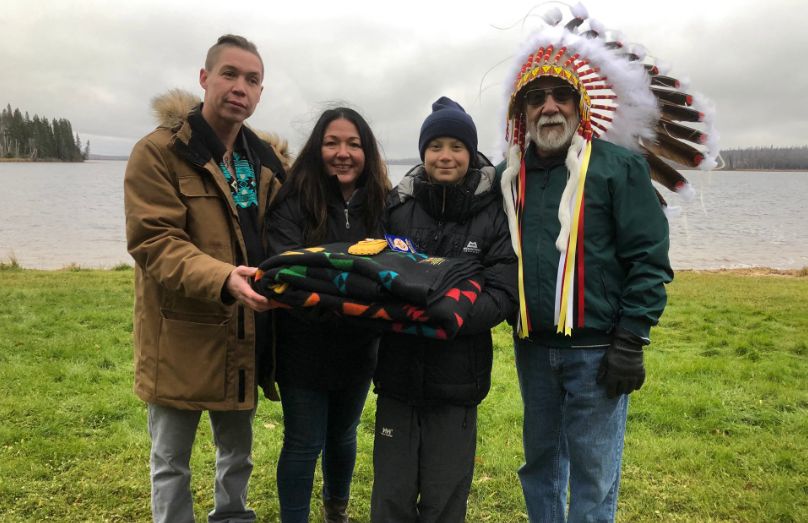Three First Nations in northeastern Alberta say they are formally appealing a decision by a provincial regulator to unilaterally suspend dozens of requirements for oil and gas companies to monitor air, water and wildlife around industrial projects.

The three nations, Athabasca Chipewyan First Nation, Fort McKay First Nation and Mikisew Cree First Nation, said the decisions would have “significant” health and environmental impacts, but the Alberta Energy Regulator (AER) failed to consult them.
The regulator announced the suspensions through a series of decisions on April 29, May 1, May 5 and May 20 explaining that major oil companies had sent “legitimate concerns” they would not be able to continue some environmental monitoring, while respecting Alberta’s COVID-19 health guidelines.
It also said that it considered the risks of temporarily suspending some monitoring requirements to be low. The province’s chief scientist has agreed that temporary suspensions of monitoring requirements are low risk.
Alberta’s Opposition leader called on Monday for the head of the province’s energy regulator to resign over the suspensions.
“They should end (Laurie) Pushor’s contract,” Rachel Notley said Monday.
“We’ve gone from having a world-class monitoring agency and we’ve turned it into a backroom, deal-making agency in the course of just a few months.”
The regulator initially suspended monitoring requirements at a group of 16 oilsands projects operated by four major companies. Within a few weeks, it expanded the scope of the changes to include the suspension of many environmental monitoring requirements all across the oil and gas industry.
The regulator said that some of the suspensions of requirements to monitor groundwater would expire on Sept. 30, but it has not set similar deadlines to lift suspensions for other changes.
The AER said it made its decisions after private discussions with industry. It didn’t invite members of the public or First Nations to participate in the process through consultations as would normally be the case prior to regulatory changes of this nature.

Had they been consulted, the chiefs said that they could have found ways to identify and mitigate potential impacts on their traditional territory.“
“A significant part of our concern is the lack of due process,” said Archie Waquan, chief of the Mikisew Cree First Nation in a statement released on Friday.

Get daily National news
“Industry should not be able to petition its own regulator to relax approval conditions with virtually no oversight. This industry needs to maintain its pursuit of ethical oil. This is not how you do it.”
Alberta Environment and Parks, which regulates other sectors under the same provincial environmental laws has not announced plans to suspend monitoring requirements, but a government spokesperson said the department is considering it.
It’s not clear why the energy regulator failed to inform or consult with the affected First Nations.
In the days leading up to its decisions, the nations said that their own representatives sat down with AER, government and industry representatives to discuss oilsands monitoring, but no one told them what they were discussing in private.
“We were not notified — in fact, we would have no idea this had occurred if it had not been revealed in the press,” said Mel Grandjamb, chief of Fort McKay First Nation.
A few days after announcing its initial decisions to suspend monitoring requirements at 16 oilsands mining projects, the regulator told Global News on May 11 that it was “committed to providing information to Indigenous communities about changes of importance to them.”
“We are reaching out to several First Nations and Métis communities in the oilsands mining area regarding the temporary relief measures to comply with the current public health orders,” the regulator said in an email.
“Working well with Indigenous communities and stakeholders is important to the regulator successfully achieving its mandate.”
Nine days later, First Nations said they were caught off guard by some new decisions by the regulator on May 20, when it announced it was unilaterally expanding its suspension of monitoring requirements, affecting other in situ oilsands projects as well as all oil and gas projects across the province.
The chiefs said in their statement that this type of behaviour doesn’t encourage reconciliation between Alberta and First Nations.
“After the press caught AER suspending monitoring for oilsands mines, it promised to do better. Then, just weeks later, it issued further suspensions to in situ and conventional oil and gas development,” said Grandjamb, chief of Fort McKay First Nation.
“Again, we were not consulted or even notified.”
While the AER was reviewing its decisions to suspend monitoring requirements in April, the provincial government informed Indigenous communities that it was resuming requirements for the First Nations to finish consultations with companies on newly-proposed industrial projects. The Alberta government had previously paused this process to avoid putting Indigenous communities at risk of COVID-19.
These steps require affected First Nations to hold meetings and respond to project proposals before a set deadline, or lose an opportunity to provide feedback or propose changes to new projects.
Some of the affected First Nations said this would create a challenge due to limited access to internet in some regions, as well as put some elders who prefer to have face-to-face contact at risk. The government said at the time that communities could still apply for a “pause” if needed and that it encouraged industry to use technology to pursue safe consultations when possible.
The AER didn’t immediately respond to a request for comment about the appeal filed by the three First Nations.
Notley said Pushor, who took over the agency after its previous head left under a cloud of financial wrongdoing, is too close to the Premier Jason Kenney’s United Conservative government to be an independent regulator.
“There’s no question that Pushor is an extension of Kenney’s UCP agenda. They’re one and the same.”
She said consulting with First Nations affected by a regulatory decision should be “instinctive “by now.
“They walked through the looking glass into a world that’s 25 years old.,” Notley said Monday.
The regulator has previously said it was in “regular contact” with industry groups such as the Canadian Association of Petroleum Producers (CAPP) and the Explorers and Producers Association of Canada, to “work together to navigate through the current situation.”
In a statement sent to Global News on Friday, CAPP defended the temporary suspension of monitoring requirements, noting that it was related to a series of strict measures taken by companies to minimize person-to-person contact and establish social distancing.”
To effectively implement these practices, all non-essential activities have been postponed to significantly reduce the number of people working on-site,” CAPP said in the statement. “With less people working on sites, there are a number of existing regulatory requirements for which compliance will be a challenge.”
The industry lobby group also said that the temporary changes allow companies to focus on critical areas of operation and ensure effective environmental policies. It also noted that operators must continue to meet environmental protection requirements and could be expected to report retroactively on some matters once business returns to normal.
CAPP did not respond to a question asking for its reaction to the appeal launched by the First Nations.
Meantime, Jess Sinclair, a spokeswoman for Alberta Environment Minister Jason Nixon, said the provincial department is also considering to suspend some monitoring requirements, but she declined to provide details or identify which sectors would be affected.
The province’s chief scientist, Fred Wrona, said that “temporary suspensions occurring in select environmental monitoring programs as a result of COVID-19 are low-risk and should not significantly compromise the integrity of Alberta’s long-term environmental data and information systems.”
Wrona also said that “that the longer monitoring has been in place, the more easily we can detect changes in trends following any short-term pause of data collection,” according to a statement, provided by Sinclair.
–With files from The Canadian Press








Comments
Want to discuss? Please read our Commenting Policy first.